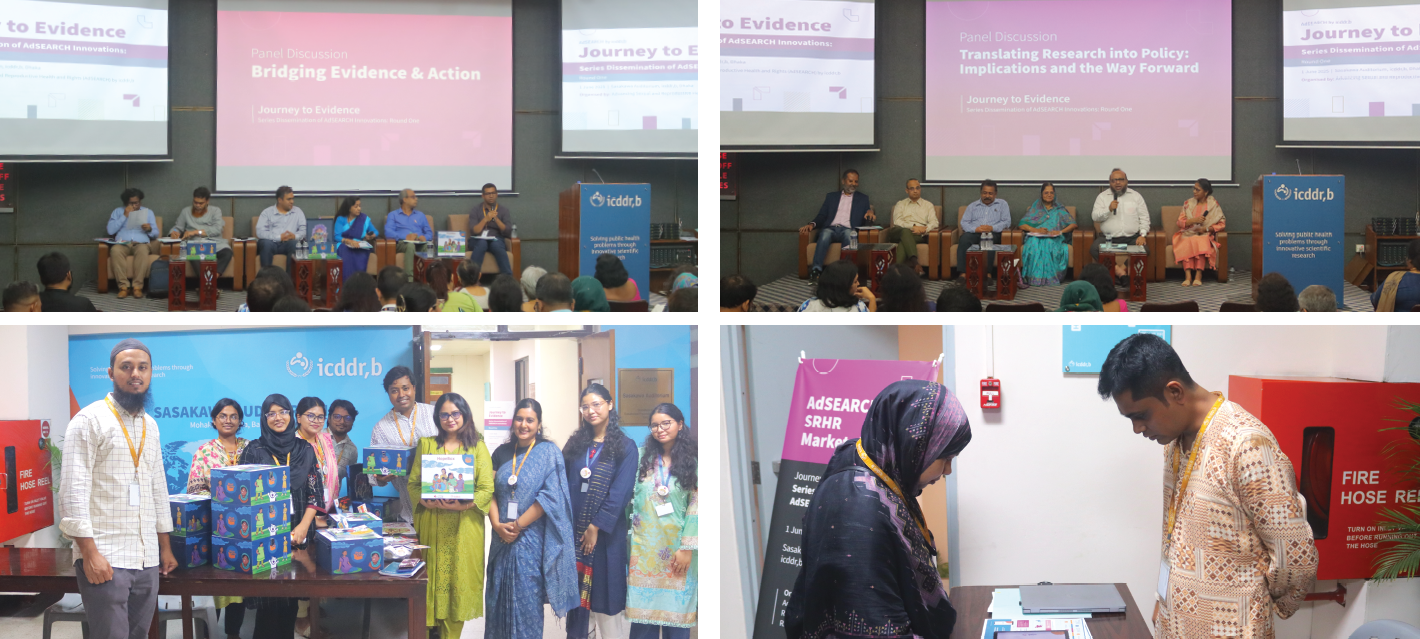AdSEARCH by icddr,b has launched “Journey to Evidence: Series Dissemination of AdSEARCH Studies,” a platform to influence policy and programme related to Sexual and Reproductive Health and Rights (SRHR). As a part of this journey to enhance and document the collective knowledge, evidence, and ideas on select SRHR issues, this platform will organise a series of dissemination sessions in 2025.
On 1 June 2025, the first round of Journey to Evidence brought together four innovative studies on adolescent SRHR at the icddr,b Sasakawa Auditorium in Dhaka. Aimed at addressing the diverse needs and challenges of adolescents in various contexts, the featured innovations included the HopeBox study, which improved menstrual hygiene and contraception knowledge among orphaned girls in government facilities. Mukhorito, a mobile app piloted in secondary schools, enhanced adolescent SRHR learning and peer communication. A third study focused on menstrual health among adolescent athletes at BKSP, while the fourth explored the feasibility of menstrual cup use among female garment workers, both highlighting overlooked areas in SRHR interventions.
Overview of the Four Studies
HopeBox:
Fariya Rahman, Principal Investigator and Research Investigator, MCHD presented the ʻHopeBoxʼ study, focused on orphaned adolescent girls in government orphanages in Dhaka, Faridpur, and Chuadanga. Using an SRHR toolkit comprising illustrated books and placards, the intervention significantly improved knowledge on menstrual hygiene and contraception—from just 4–11% before the intervention to 51–59% after. Experts recommended national-scale adoption of the initiative.
‘’Orphaned adolescents remain a neglected group. This initiative is commendable.”
– Syed Rubayet Country director ipas Bangladesh
Mukhorito:
Dr Hassan Rushekh Mahmood, Principal Investigator and Assistant Scientist, MCHD, highlighted the Mukhorito study, a mobile app piloted in three secondary schools, helped adolescents learn about SRHR topics. With relatable stories, interactive design, and engaging content, Mukhorito enabled adolescents to learn independently about topics like reproductive health, drug abuse, and physical changes. The average knowledge score rose from 5.7 to 7.5, and awareness from 6.6 to 8.7-an improvement of 16%.
‘’Adolescents must be provided with accurate and age-appropriate information. We need long-term programmes and a coordinated, multi-sectoral approach to effectively meet their needs.”
-Md. Shamsul Hoque Programme Manager (Adolescent Health), Directorate General of Health Services (DGHS)
Menstrual Experience of Adolescent Athletes:
Dr Mehjabin Tishan Mahfuz, Principal Investigator and Assistant Scientist, NRD, presented the study on the menstrual experience of adolescent athletes Conducted at the Bangladesh Krira Shikkha Protishtan (BKSP). The study revealed that 86% of female athletes lacked adequate menstrual education. Only 5% received guidance from teachers or coaches, and many faced dietary and physical activity restrictions. The study called for menstrual health education and gender-sensitive sports policies.
‘’Bangladeshi girls are achieving greater success in the field of sports every day. If we can work together to remove the barriers they face, their journey forward will become much easier and smoother.”
– Professor Anupam Hossain International Sports Development Consultant
Piloting Menstrual Cup Use Among RMG Workers:
Nabila Mahmood, Principal Investigator and Research Investigator, NRD, shared findings from a pilot study on Menstrual Cup use among RMG workers. This study assessed the feasibility of using menstrual cups among ready-made garment workers. Conducted across five factories within Dhaka and Gazipur City Corporations, the study involved 85 women over six menstrual cycles. Results indicated that menstrual cup use lowered costs, increased comfort, and was suitable for low-resource workplace environments. A menstrual cup is a soft, bell-shaped device made from 100% medical-grade silicone, designed to be inserted into the vagina to collect menstrual flow. Researchers recommended broader adoption in similar settings.
The event started with a welcome address by Dr Anisur Rahman, Scientist and Acting Senior Division Director of MCHD, icddr,b. Anisuddin Ahmed, Project Coordinator of AdSEARCH, shared the journey of AdSEARCH innovations, highlighting the project's contributions to advancing SRHR in Bangladesh. The event also featured two impactful panel discussions where government representatives, professional bodies, and experts shared insights on scaling these innovations. The first panel, titled “Bridging Evidence and Action,” focused on translating study findings into programme implementation and coordination. Panelists included: Samir Mallick, Director (Institution), Department of Social Services (DSS); Md Shaidul Islam, Additional Director, DSS; Dr S.M. Abdullah-Al-Murad, Line Director, MNC&AH, DGHS; Dr Md. Shamsul Hoque, Programme Manager (Adolescent Health), DGHS; Professor Farhana Dewan, President, OGSB. Panelists emphasised the importance of inclusive programme design, adolescent-friendly services, and ensuring continuity of SRHR education within institutional settings. They called for strengthened partnerships between government and civil society to sustain impact. The second panel, “Translating Research into Policy: Implications and the Way Forward,” followed the final two study presentations. This discussion focused on the policy relevance of menstrual health research among athletes and RMG workers. Panelists included: Dr Md Sultan Ahmed, Director, MCH Services, DGFP; Dr Md Sohel Habib, Line Director, MCRAH, DGFP; Dr Md Monjur Hossain, Programme Manager, A&RH, DGFP; Professor Sayeba Akhter, Chairman, BMRC; Dr Vibhavendra Singh Raghuvanshi, Chief of Health, UNFPA; Professor Anupam Hossain, International Sports Development Consultant. Speakers highlighted the urgent need for policy frameworks that support menstrual health education in schools, sports institutions, and factories. They discussed pathways to institutionalise low-cost innovations like menstrual cups and emphasised that workplace and athletic environments must be gender-sensitive and health-inclusive. At the closing session of the event, Farzana Sultana, Development Advisor at High Commission of Canada to Bangladesh, reaffirmed Canadaʼs continued support for advancing SRHR in Bangladesh. The event concluded with a vote of thanks from Dr Quamrun Nahar, Deputy Project Director, AdSEARCH and Head of Research, MCHD. Key officials from DGHS, DGFP, and other relevant institutions attended the event, which marked the beginning of a broader dissemination series planned throughout 2025.
‘’If we fail to address adolescent girls' health, we will not have healthy mothers or a healthy generation.”
-- Professor Sayeba Akhter Chairperson, Bangladesh Medical Research Council (BMRC)
